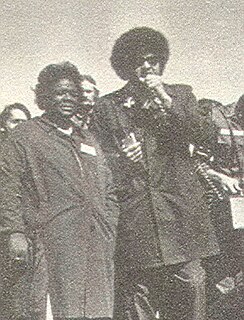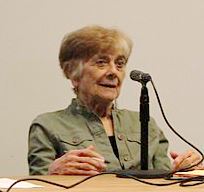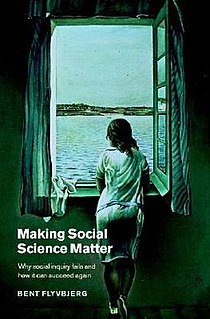
Neoliberalism or neo-liberalism is the 20th-century resurgence of 19th-century ideas associated with economic liberalism and free-market capitalism. It is generally associated with policies of economic liberalization, including privatization, deregulation, globalization, free trade, austerity, and reductions in government spending in order to increase the role of the private sector in the economy and society; however, the defining features of neoliberalism in both thought and practice have been the subject of substantial scholarly debate. In policymaking, neoliberalism was part of a paradigm shift that followed the failure of the Keynesian consensus in economics to address the stagflation of the 1970s.
The welfare state is a form of government in which the state protects and promotes the economic and social well-being of the citizens, based upon the principles of equal opportunity, equitable distribution of wealth, and public responsibility for citizens unable to avail themselves of the minimal provisions for a good life. Sociologist T. H. Marshall described the modern welfare state as a distinctive combination of democracy, welfare, and capitalism.
William Julius Wilson is an American sociologist. He is a professor at Harvard University and author of works on urban sociology, race and class issues. Laureate of the National Medal of Science, he served as the 80th President of the American Sociological Association, was a member of numerous national boards and commissions. He identified the importance of neighborhood effects and demonstrated how limited employment opportunities and weakened institutional resources exacerbated poverty within American inner-city neighborhoods.

Robert Jervis is the Adlai E. Stevenson Professor of International Politics in the Department of Political Science at Columbia University, and is a member of the Arnold A. Saltzman Institute of War and Peace Studies in the School of International and Public Affairs. He has been a member of the faculty since 1980. Jervis was the recipient of the 1990 University of Louisville Grawemeyer Award for Ideas Improving World Order. Jervis is co-editor of the Cornell Studies in Security Affairs, a series published by Cornell University Press, and the member of numerous editorial review boards for scholarly journals. According to the Open Syllabus Project, Jervis is the fourth most frequently cited author on college syllabi for political science courses.

Sir Anthony Barnes Atkinson was a British economist, senior research fellow of Nuffield College, Oxford, and Centennial Professor at the London School of Economics.

The National Welfare Rights Organization (NWRO) was an American activist organization that fought for the welfare rights of people, especially women and children. The organization had four goals: adequate income, dignity, justice, and democratic participation. The group was active from 1966 to 1975. At its peak in 1969, NWRO membership was estimated at 25,000 members. Thousands more joined in NWRO protests.

Richard Andrew Cloward was an American sociologist and an activist. He influenced the Strain theory of criminal behavior and the concept of anomie, and was a primary motivator for the passage of the National Voter Registration Act of 1993 known as "Motor Voter". He taught at Columbia University for 47 years.

Frances Fox Piven is an American professor of political science and sociology at The Graduate Center, City University of New York, where she has taught since 1982.
Bent Flyvbjerg is a Danish economic geographer. He is Professor of Major Programme Management at Oxford University's Saïd Business School and the first Director of the University's BT Centre for Major Programme Management. He was previously Professor of Planning at Aalborg University, Denmark and Chair of Infrastructure Policy and Planning at Delft University of Technology, The Netherlands. He is a fellow of St Anne's College, Oxford.
Fred L. Block is an American sociologist, and Research Professor of Sociology at the University of California, Davis. Block is widely regarded as one of the world’s leading economic and political sociologists. His interests are wide ranging. He has been noted as an influential follower of Karl Polanyi.

Paul Pierson is an American professor of political science and holder of the John Gross Endowed Chair of Political Science at the University of California, Berkeley. From 2007-2010 he served at UC Berkeley as Chair of the Department of Political Science. He is noted for his research on comparative public policy and political economy, the welfare state, and American political development. His works on the welfare state have been characterized as influential.
The Cloward–Piven strategy is a political strategy outlined in 1966 by American sociologists and political activists Richard Cloward and Frances Fox Piven.
Lawrence M. Mead III is a professor at New York University, where he is currently professor of politics and public policy.
Progressivism is a political philosophy in support of social reform. Based on the idea of progress in which advancements in science, technology, economic development and social organization are vital to the improvement of the human condition, progressivism became highly significant during the Age of Enlightenment in Europe, out of the belief that Europe was demonstrating that societies could progress in civility from uncivilized conditions to civilization through strengthening the basis of empirical knowledge as the foundation of society. Figures of the Enlightenment believed that progress had universal application to all societies and that these ideas would spread across the world from Europe.
Christopher Sandy Jencks is an American social scientist.

Making Social Science Matter: Why Social Inquiry Fails and How It Can Succeed Again is a 2001 book by Bent Flyvbjerg, published by Cambridge University Press. The author is critical of social sciences to the extent they try to emulate natural science. First, he argues that social sciences have failed as science, that is, in producing predictive theory. Second, he develops an argument that in order to matter again, social sciences must model themselves after phronesis. Finally, he develops methodological guidelines and shows practical examples of how a phronetic social science may be employed for research purposes.

Social movement impact theory is a subcategory of social movement theory, and focuses on assessing the impacts that social movements have on society, as well as what factors might have led to those effects.

Kim Yun-Tae is a South Korean academic and politician. He is a member of the Minjoo Party of Korea, and is currently a professor, Department of Sociology, and Department of Social Welfare, Korea University. A sociologist, Kim is an active social welfare advocate. He has written academic and popular works regarding social issues, welfare, and politics in Korea. In 1986, Kim, as a president of student association in Korea University, contributed to university students' democratic movement and served a prison sentence of two years and six months.

Christoph Butterwegge is a German political scientist and poverty researcher. From 1998 to 2016 he was Professor of Political Science at the Institute for Comparative Education and Social Sciences at the Humanities Faculty of the University of Cologne and is a member of the Research Center for Intercultural Studies (FiSt).

Monica Prasad is an American sociologist, and has won several awards for her books on economic and political sociology.












